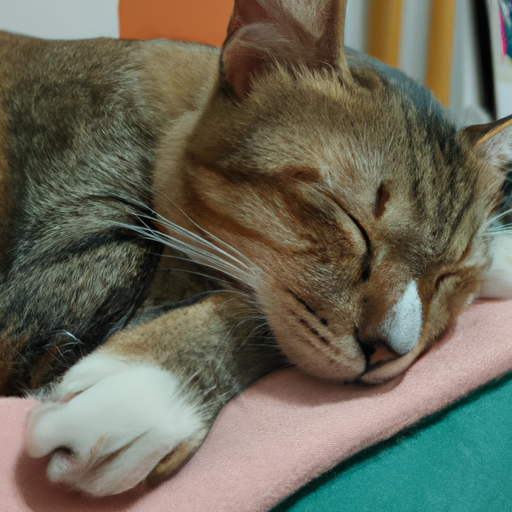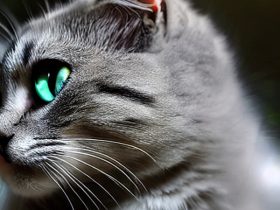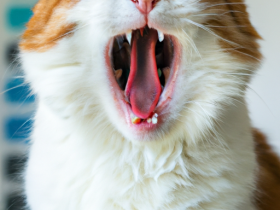“Unlock the Mystery: Discover the Science Behind Why Cats Sleep So Much!”
Introduction
Cats are known for their love of sleep, often spending up to 16 hours a day snoozing. But why do cats sleep so much? It turns out that cats have evolved to sleep more than other animals due to their unique physiology and lifestyle. In this article, we’ll explore the science behind why cats sleep so much and how it affects their health and behavior. We’ll also discuss how to ensure your cat is getting enough rest and how to help them sleep better.
How Much Sleep Do Cats Need? Exploring the Science Behind Cat Sleep Habits
Cats are known for their love of sleep, but how much sleep do cats need? Understanding the science behind cat sleep habits can help pet owners ensure their cats are getting the rest they need.
Cats are crepuscular animals, meaning they are most active during the twilight hours of dawn and dusk. This is why cats often sleep during the day and become active at night. Cats typically sleep for 12-16 hours a day, with some cats sleeping up to 20 hours a day. This is because cats are naturally programmed to sleep for long periods of time in order to conserve energy.
Cats also have different sleep cycles than humans. Cats experience two types of sleep: non-rapid eye movement (NREM) sleep and rapid eye movement (REM) sleep. NREM sleep is the deeper, more restorative type of sleep, while REM sleep is the lighter, more active type of sleep. Cats spend about 75% of their sleep in NREM sleep and 25% in REM sleep.
Cats also have different sleep needs depending on their age. Kittens need more sleep than adult cats, as they are still growing and developing. Kittens typically sleep for 16-20 hours a day, while adult cats usually sleep for 12-16 hours a day.
Finally, cats need a comfortable and safe environment in order to get a good night’s sleep. Cats should have a comfortable bed or sleeping area that is away from loud noises and other disturbances. Cats also need a regular sleep schedule, as this helps them stay healthy and alert.
Understanding the science behind cat sleep habits can help pet owners ensure their cats are getting the rest they need. By providing a comfortable and safe environment and establishing a regular sleep schedule, pet owners can help their cats get the rest they need to stay healthy and alert.
What Causes Cats to Sleep So Much? Investigating the Biological Reasons for Cat Naps
Cats are known for their love of sleep, often spending up to 16 hours a day snoozing. But why do cats sleep so much? Investigating the biological reasons behind cat naps can help us understand why cats need so much rest.
Cats are crepuscular animals, meaning they are most active during the twilight hours of dawn and dusk. This is due to their evolutionary history as predators, as these are the times when their prey is most active. As a result, cats have adapted to sleep during the day and be active at night.
Cats also have a unique sleep cycle. Unlike humans, cats do not experience deep sleep. Instead, they experience a light sleep known as “catnaps”. These catnaps last anywhere from 15 minutes to an hour and are usually followed by a period of alertness. This cycle of light sleep and alertness allows cats to remain vigilant and ready to pounce on their prey.
Cats also have a unique sleep hormone called melatonin. This hormone helps regulate their sleep-wake cycle and helps them stay alert during the day. Cats also have a higher concentration of melatonin in their bodies than humans, which helps explain why they need more sleep.
Finally, cats sleep more than humans because they are smaller and have a higher metabolism. This means they need more rest to conserve energy and stay healthy.
In conclusion, cats sleep more than humans because of their evolutionary history as predators, their unique sleep cycle, their higher concentration of melatonin, and their higher metabolism. Understanding the biological reasons behind cat naps can help us better understand our feline friends and why they need so much rest.
The Benefits of Cat Naps: How Cat Sleep Enhances Health and Well-Being
Cats are known for their love of sleep, and it turns out that their naps are more than just a way to pass the time. Cat naps can have a positive effect on a cat’s health and well-being. Here, we will explore the benefits of cat naps and how they can enhance a cat’s life.
One of the most important benefits of cat naps is that they help cats to stay alert and active. Cats are naturally active animals, and they need to be able to stay alert in order to hunt and explore their environment. Cat naps help cats to stay alert and active by allowing them to rest and recharge. This helps cats to stay focused and alert, which can be beneficial for their overall health and well-being.
Cat naps also help cats to stay healthy. Cats need to get enough sleep in order to stay healthy, and cat naps can help cats to get the rest they need. Cat naps can help cats to stay healthy by allowing them to rest and recharge, which can help to reduce stress and fatigue. This can help cats to stay healthy and active, which can be beneficial for their overall health and well-being.
Cat naps can also help cats to stay relaxed and calm. Cats can become stressed and anxious, and cat naps can help cats to stay relaxed and calm. Cat naps can help cats to relax and unwind, which can help to reduce stress and anxiety. This can help cats to stay relaxed and calm, which can be beneficial for their overall health and well-being.
Finally, cat naps can help cats to stay happy and content. Cats need to be able to relax and enjoy their environment in order to stay happy and content. Cat naps can help cats to relax and enjoy their environment, which can help to reduce stress and anxiety. This can help cats to stay happy and content, which can be beneficial for their overall health and well-being.
In conclusion, cat naps can have a positive effect on a cat’s health and well-being. Cat naps can help cats to stay alert and active, stay healthy, stay relaxed and calm, and stay happy and content. These benefits can be beneficial for a cat’s overall health and well-being, and can help cats to lead a happy and healthy life.
Understanding Cat Sleep Cycles: How Cats Sleep Differently Than Humans
Cats are known for their ability to sleep for long periods of time, but their sleep cycles are quite different from those of humans. Understanding how cats sleep can help us better care for our feline friends and ensure they get the rest they need.
Cats are polyphasic sleepers, meaning they take multiple short naps throughout the day and night. This is in contrast to humans, who are monophasic sleepers, meaning they take one long sleep period each day. Cats typically sleep for 12-16 hours a day, but this can vary depending on the individual.
Cats also have different sleep cycles than humans. While humans experience four stages of sleep, cats experience only two: light sleep and deep sleep. During light sleep, cats are easily awakened and can be active. During deep sleep, cats are in a state of deep relaxation and are difficult to wake.
Cats also have a unique sleep pattern known as “catnaps.” These short naps usually last between 15 and 30 minutes and occur throughout the day and night. During these naps, cats are in a light sleep state and can be easily awakened.
Finally, cats are also known for their ability to sleep in unusual positions. Cats can sleep in a variety of positions, including standing up, curled up in a ball, or even upside down. This is due to their flexible spine and strong muscles, which allow them to contort their bodies into different positions.
Understanding how cats sleep can help us better care for our feline friends. Cats need plenty of rest to stay healthy and happy, so it’s important to provide them with a comfortable and safe sleeping environment. Additionally, cats should be given plenty of opportunities to take catnaps throughout the day and night. By understanding cat sleep cycles, we can ensure our cats get the rest they need.
Exploring the Effects of Cat Sleep Deprivation: What Happens When Cats Don’t Get Enough Rest?
Cats are known for their love of sleep, but what happens when they don’t get enough rest? Sleep deprivation in cats can have serious consequences, both physical and behavioral. Understanding the effects of cat sleep deprivation can help pet owners ensure their cats are getting the rest they need.
Physically, cats that don’t get enough sleep can become lethargic and weak. They may also experience weight loss, as their bodies are unable to properly process food without adequate rest. In addition, cats that are sleep deprived may have weakened immune systems, making them more susceptible to illness and disease.
Behaviorally, cats that don’t get enough sleep may become irritable and aggressive. They may also become more vocal, meowing and yowling more than usual. Sleep deprivation can also lead to changes in litter box habits, as cats may become too tired to make it to the box in time.
In order to ensure cats get the rest they need, pet owners should provide a comfortable, quiet sleeping area for their cats. Cats should also be given plenty of opportunities to rest during the day, as cats are naturally more active at night. Additionally, cats should be given regular exercise to help them relax and sleep better.
By understanding the effects of cat sleep deprivation, pet owners can help ensure their cats are getting the rest they need. With adequate rest, cats can stay healthy and happy for years to come.
Q&A
1. Why do cats sleep so much?
Cats sleep so much because they are naturally crepuscular animals, meaning they are most active during dawn and dusk. This means that cats are naturally programmed to sleep during the day and be active at night. Additionally, cats are predators and need to conserve their energy for hunting and other activities.
2. How much sleep do cats need?
Cats typically need between 12-16 hours of sleep per day. This can vary depending on the age and activity level of the cat. Kittens and senior cats may need more sleep than adult cats.
3. What is the difference between cat naps and deep sleep?
Cat naps are short periods of light sleep that cats take throughout the day. Deep sleep is a longer period of restful sleep that cats take at night.
4. What are the benefits of cats sleeping so much?
Cats sleeping so much helps them to conserve energy, stay alert, and remain healthy. It also helps them to stay in tune with their natural circadian rhythms.
5. Are there any risks associated with cats sleeping too much?
Yes, cats sleeping too much can lead to obesity, lethargy, and other health issues. It is important to make sure that cats are getting enough exercise and stimulation throughout the day to prevent them from sleeping too much.
Conclusion
In conclusion, cats sleep so much because of their evolutionary history and their natural instincts. Cats are predators and need to conserve energy for hunting, so they sleep more than other animals. Cats also have a unique sleep cycle that includes both light and deep sleep, which helps them stay alert and ready for action. Cats also have a higher body temperature than humans, which means they need more sleep to regulate their body temperature. Finally, cats have a unique circadian rhythm that helps them stay in tune with their environment and helps them stay active during the day and sleep during the night. All of these factors combine to explain why cats sleep so much.








Leave a Reply
View Comments